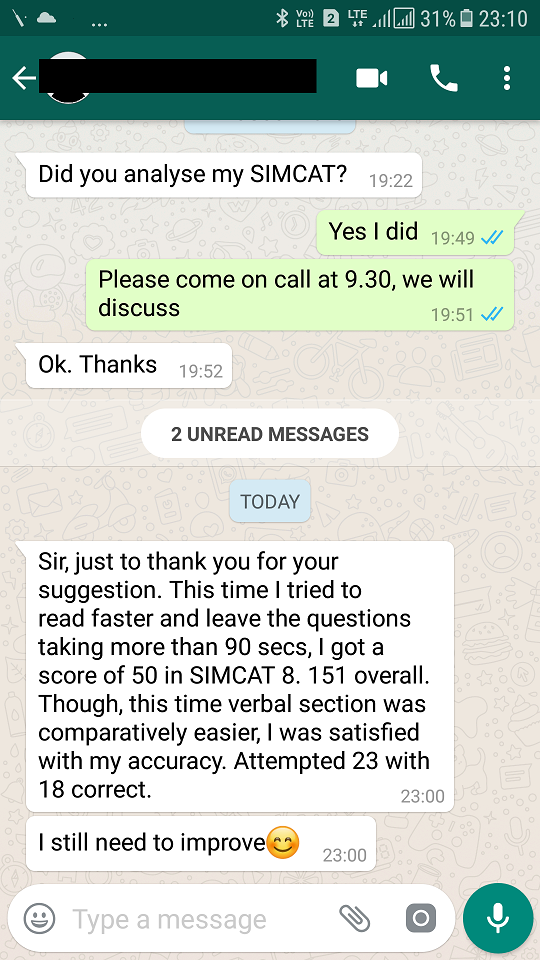I often receive messages and emails from CAT aspirants lamenting their low accuracy in the CAT RC, i.e., reading comprehension passages. In this article, I will try to explain the reasons behind this low accuracy, and, simultaneously, lay out a strategy that could be of some help to improve reading comprehension accuracy.
70% percent is the bare minimum accuracy that the student must aim for in the reading comprehension questions. 80% should make him happy, and anything above 80% should be a cause for celebration. If you are consistently having 80% accuracy, then you have mastered one of the toughest question categories of verbal aptitude.
If your reading comprehension accuracy is below 70 %, then you must rethink your approach to reading comprehensions.
There are two important things in RC: the passage, and the question (this includes the options as well). You score marks by getting the question correct; so, much of your energy and time must be spent on the question. There has to be a good balance between the time you spend on the passage and the time you spend on the questions.
Spending too much time reading the passage means having too little time for the questions.
The question is what percentage of the passage you should understand to be able to mark all the questions correctly. My guess is that if you have understood around 40% of the passage, you would be in a good position to work out the main idea and the overall picture of the passage. These two are very important. The rest of the understanding you can get when you attempt the questions.
There are students who understand only 40% of the passage and still get all the questions correct; on the other hand, there are students who understand every subtle thing in the passage, and yet are not able to get even 50% of the questions correct. The reason is that reading is one thing but being able to eliminate the options by using your reasoning skills is quite another thing.
But there are occasions when we try to answer the questions even when we have hardly understood 10% of the passage. And it is precisely in these sort of passages that the students’ accuracy falls below 50%!
RC improvement needs patience and persistence. To improve your accuracy beyond 80%, you must practice from the right material.
What kind of reading comprehension passages should you attempt?
Before you make up your mind on whether to attempt or leave the passage, you must first go through the first few lines of that passage, also casually scan the subsequent lines, and see if you are comfortable with the passage. There must be some degree of acceptance from your end.
There is no need for you to read the questions; prima facie, the question may look simple or difficult, but the answers to those questions are there in the passage! It is the passage that has the key to all the mysteries, and if the passage has not been well understood, the chances of your getting the questions incorrect are very high! After all, you eliminate your options by looking at the contents of the passage, and by comparing and matching the options with the ideas given in the passage.
The passages that come in CAT are seldom abstruse and never have archaic language. Most of the passages are plucked from books, magazines or research papers written by contemporary writers, not by Shakespearean critics of the 18th century.
What makes a reading comprehension tough?
I have observed that in reading comprehension, the tough thing is the passage, not the question! In other words, if the passage is easy for you to understand in the very first reading, then it is quite likely that you have not only comprehended the passage but also have understood the hidden and the implied ideas of the passage.
The questions of a well-comprehended passage, no matter how tough, can be answered through option elimination; on the other hand, questions of a superficially-comprehended passage, no matter how easy, may go wrong.
Even if the passage has too many unfamiliar terms, you can answer all the questions if you have correctly understood the logical relationship between those terms. So don’t be disconcerted by a passage that is on Sociology, Philosophy, Biology or any –logy for that matter; it is not the –logy that should decide your passage selection, rather it is the understanding, the language, and the style in which the passage has been written that should decide your passage selection. If you go only by the –logy, then it is quite possible that on the examination day, you might leave the hall without attempting a single reading comprehension!
Don’t bother much about speed
In cricket we have a maxim for bowlers: line is mandatory, length is optional. Similarly, in reading comprehension, accuracy is mandatory, speed is optional. If the accuracy is poor, focusing on speed is a waste of time! I have seen students having sleepless nights just because they think that they don’t have the reading speed, even when their accuracy is rock-bottom at 30%!
I don’t say that the speed is not at all important, but the first step towards improvement is accuracy. Don’t strive for speed at the cost of accuracy. Speed can be gradually developed through practice, and you must try to strike the optimum balance.
What should we do once we have decided to go ahead with a particular reading comprehension?
Different people have different stories: some say read questions before you read the reading comprehension, while some says read the passage first and then attempt the question; some have even gone to the extent of recommending that the passage need not be read at all!
In exams you must do what is simple and straightforward; good and simple techniques last the longest because they work the best.
If you read the question before you read the reading comprehension, then the questions and their wordings might weigh so much on your mind and memory that you may not be able to comprehend anything about the passage! It does happen so! How will you answer those questions? Like a monkey jumping from one branch of the tree to another, you will keep on switching randomly between the passage and the question, without gaining anything significant. These things might work for the nimble-footed and the quick-witted, but not for the average aspirant.
To improve reading comprehension for CAT, you must go ahead the following steps:
Step 1: Read the passage
Read the passage, ensuring that you have understood 70% of it; if you have not understood it, don’t panic, read the whole passage again. On an average, we all—that includes me—need at least two readings to comprehend a well-written passage.
While reading you should pick the proper nouns, the very ideas that are central to the passage, for most of the RC questions are based on these proper nouns, and their relationship with other proper nouns. So, while reading, you must ensure that you not only register the proper nouns, but also, if the passage is long, observe the exact location of those proper nouns in the passage, so that if there is a question on any of those proper nouns, you are able zero down on that particular area of the passage in the shortest possible time.
Step 2: Read the first question of the RC
Questions are of two types: the first whose answers are directly stated in the passage, and the second whose answers are not directly stated, but are suggested, implied or are to be inferred from the passage.
The first type takes time, for they are based on how quickly you are able to sift through the maze of details and multitude of information given in the passage; the second type demand understanding, for they are based on how good you are in reading between the lines.
Some students are good with the first kind, while some are good with the second; you must try to be good in both; the second type demands a higher degree of caution, whereas the first needs patience.
Step 3: After reading the passage, go to that part of the passage from where the question has come
If the question is easy, you would not take much time answering the question correctly. Carefully read that part of the passage from where the question has come; compare each and every option with what is stated or suggested in the passage, and then mark the answer
Step 4: Use elimination technique for tough questions
A tough question is that in which the options are so close that it might be difficult for you to pick one and reject the other; here you must exercise both caution and discretion
Don’t rush to pick the answer, but remember one precept: there is an evidence for everything.
If you zero down on two options but are not able to pick the right choice; go to the passage, look for the evidence, what has the passage to say, where is the author’s stand, where is the evidence… so on and so forth. It is these careful deliberations that will help you arrive at the right answer.
Step 5: CAT RC more than anything need deep and thorough analysis
Learn and analyze as much as possible; you must take home some lessons from every RC and every mock. If you have stopped learning, then you have either become perfect, something that is highly unlikely or are not practicing from the right kind of material.
If you think you are suffering from RC phobia, then this is the right thing for you:
There are 500 RC questions with video explanations available here:
https://online.bodheeprep.com/
You may subscribe to our YouTube channel:
https://www.youtube.com/channel/UC6CYDHGZjp-HI-QjKHbYKUw
https://www.facebook.com/groups/CATwithbodhee/
Here are plenty of free PDFs of verbal aptitude books written by me.
https://bodheeprep.com/downloads
List of Articles on CAT Verbal Ability
- How to prepare for CAT Verbal Ability
- How to improve accuracy in Reading Comprehension
- How to Read RC Passages
- Reading Comprehension: Aricle of the Day
- 7 Easy Tips for CAT [RC] Reading Comprehension
- CAT RC : Macro and Micro Approach
- Types of Reading Comprehension Questions
- How to identify Tones of the RC Passages
- How to find main idea or central idea of the RC Passages
- How to solve inference based RC questions
- Types of Reading Comprehension Passages
- 5 most common mistakes made by students in CAT RCs
- How to approach CAT parajumbles
- CAT Para Summary Questions
- How to Solve CAT Odd sentences
- CAT Reading Comprehension: Should we read the questions first?
- If CAT Verbal Section is troubling you, read this
 Previous Years CAT RC Passages PDF
Previous Years CAT RC Passages PDFCAT Verbal Ability (topic wise) Questions with Solutions
| Reading Compehension | Parajumbles |
| Odd One Out (Odd Sentence) | Paragraph Summary |
| Critical Reasoning | Grammar |
| Daily articles to improve Reading Comprehension |
What Students Say







One Response
Highly appreciate the quality content here. A big thank you for the free materials